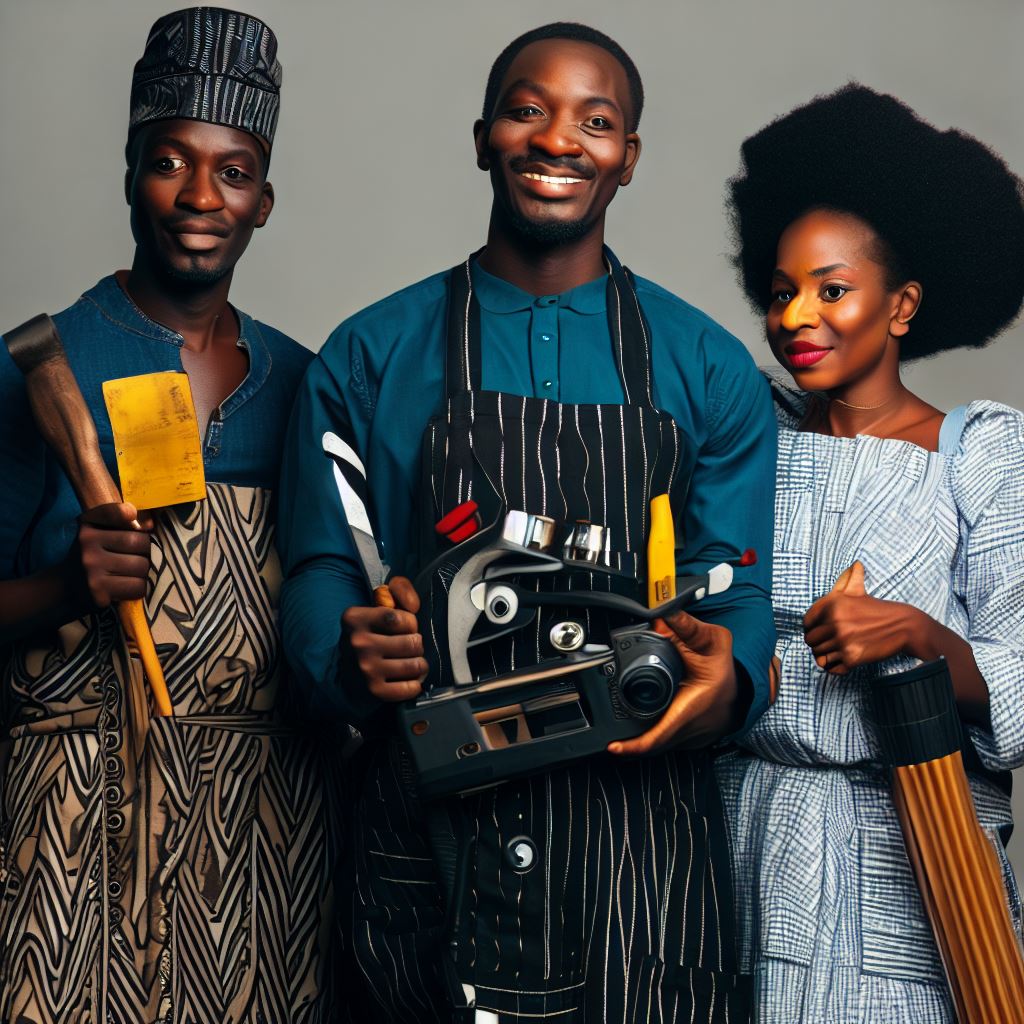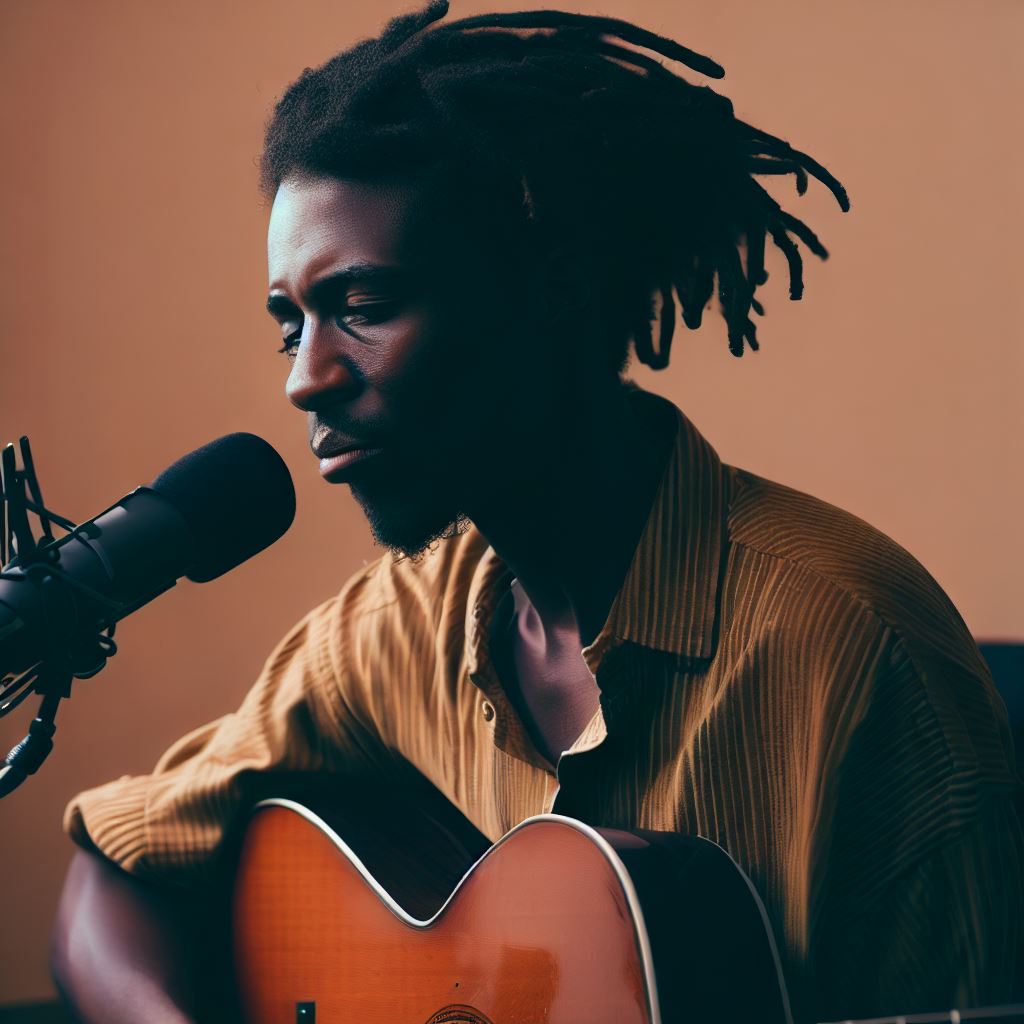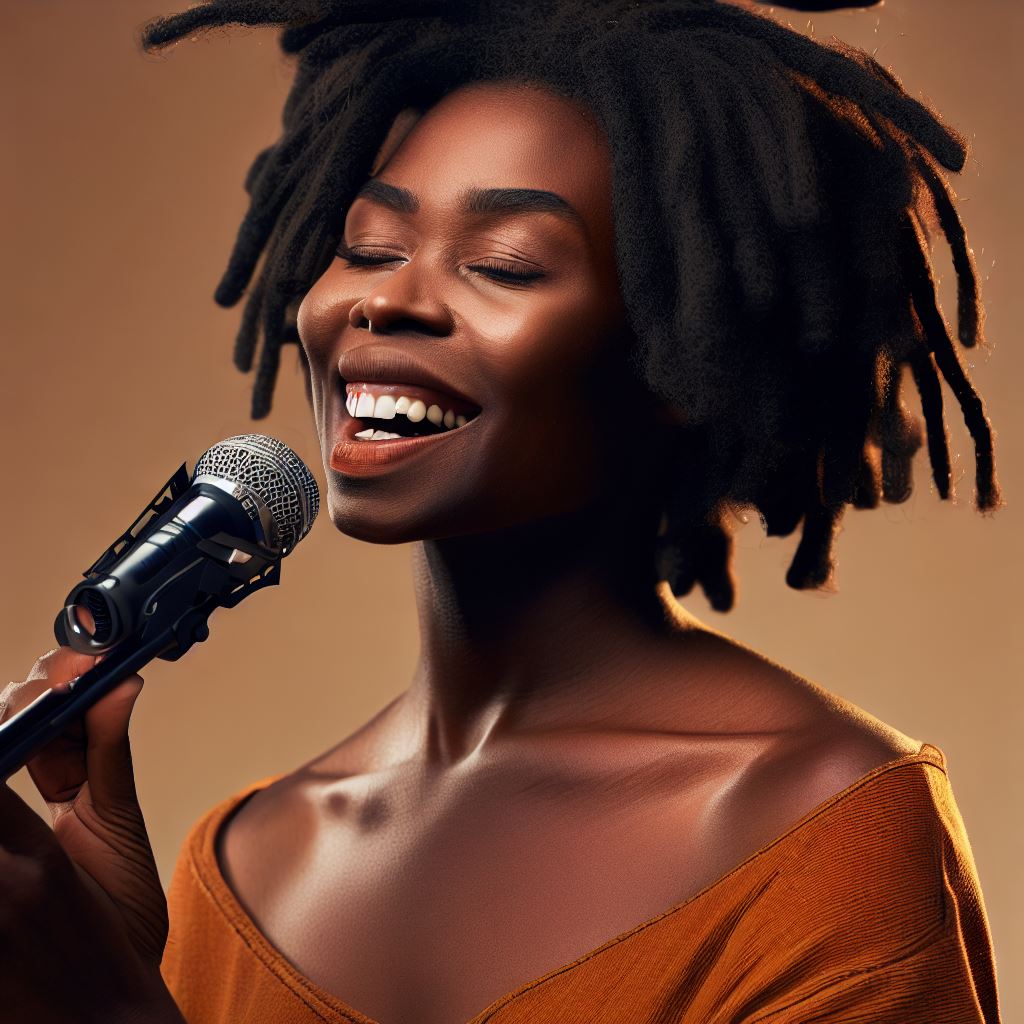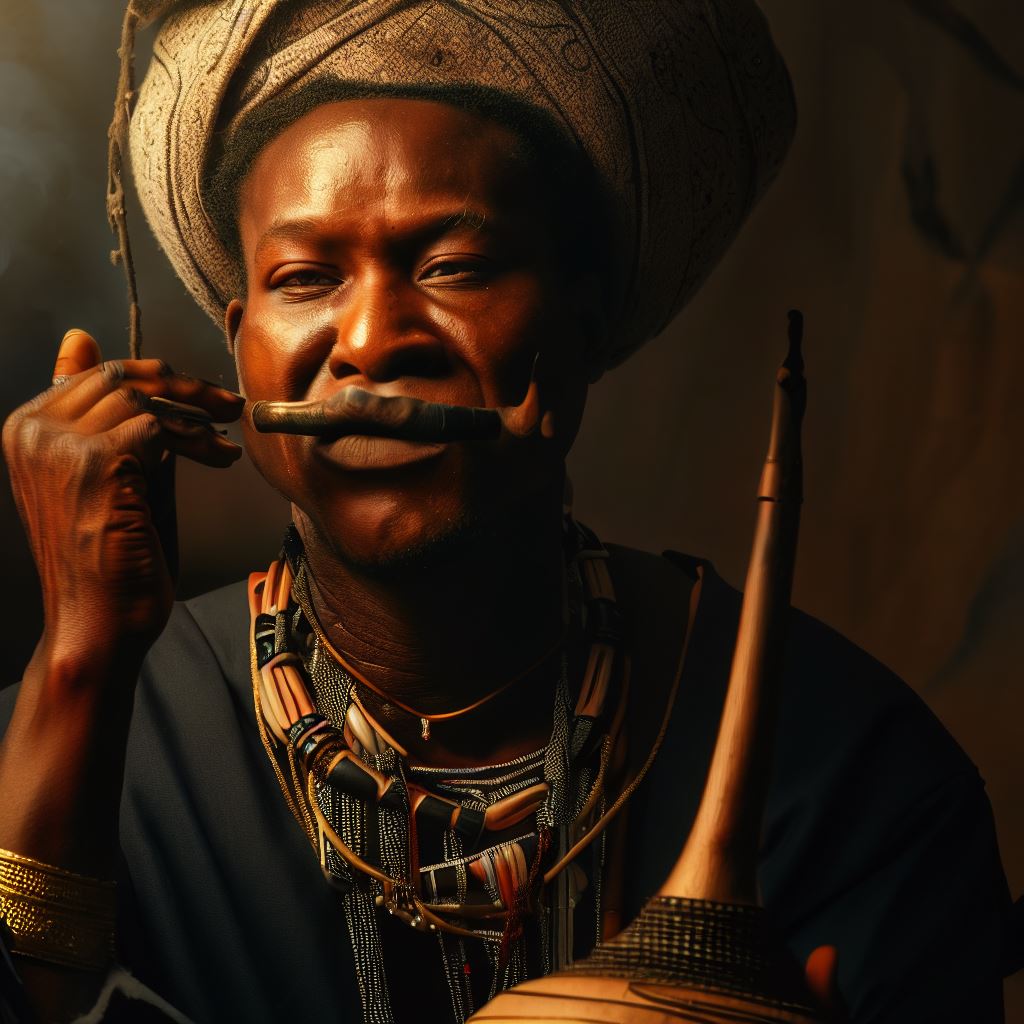Introduction
In this blog post, we will explore the Nigerian film industry, also known as Nollywood.
Nollywood is a significant part of African cinema, contributing to its growth and recognition.
In the captivating world of African cinema, Nigerian film hair stylists emerge as pioneers, weaving their artistic mastery into the very fabric of storytelling.
These unsung heroes, armed with creativity and ingenuity, transcend mere aesthetics; they become conduits for cultural narratives and bearers of social commentary.
As we delve into their remarkable journey, we shall unravel the intricate tapestry of their influence, exploring the profound impact of Nigerian film hair stylists on the ever-evolving landscape of African cinema.
Their artistry extends far beyond the superficial, creating a profound connection between hairstyles and the narratives they adorn, making them instrumental in the industry’s transformation.
Within Nollywood, Nigerian film hair stylists have played a crucial role in shaping the industry.
Their expertise in hairstyling brings authenticity to the characters and enhances the overall cinematic experience.
Join us on a journey through time and style, as we celebrate the trailblazers who have forever altered the course of African storytelling through the medium of hair.
Let us delve deeper into their contributions and impact on African cinema.
Historical Background of Nigerian Film Industry
In this section, we will provide a brief overview of the history of the Nigerian film industry, highlight the growth and influence of Nollywood, and explain the emergence of hair stylists in Nigerian cinema.
History of the Nigerian Film Industry
Nigeria’s film industry dates back to the early 20th century.
The first Nigerian film, “Palaver,” was produced in 1926 by a European film company.
However, it wasn’t until the 1960s that Nigerian filmmakers began to create their own movies.
The 1970s saw the rise of the Nigerian film industry, with the production of more indigenous films.
These early Nigerian films were mainly in local languages and focused on cultural and social issues.
Growth and Influence of Nollywood
Nollywood is the colloquial term for the Nigerian film industry, which has become the second-largest in the world.
It emerged in the 1990s as a result of the increasing availability and affordability of video technology.
Nollywood movies are known for their high production output, with hundreds of films being released annually.
These films attract a wide audience not only in Nigeria but also across Africa and the diaspora.
Nollywood has had a significant cultural and economic impact, contributing to Nigeria’s GDP and providing employment opportunities.
Emergence of Hair Stylists in Nigerian Cinema
With the growth of the Nigerian film industry, the role of hair stylists has become increasingly important.
Hair stylists in Nigerian cinema are responsible for creating unique and eye-catching hairstyles for characters.
They work closely with directors, costume designers, and makeup artists to bring characters to life.
Hair stylists are skilled in a variety of techniques, from braiding and weaving to creating intricate updos.
They incorporate cultural elements into their work, reflecting the diversity of Nigerian society.
In short, the Nigerian film industry has a rich history that dates back several decades.
The emergence of Nollywood in the 1990s propelled Nigerian cinema to international recognition.
As the industry grew, hair stylists became an integral part of the filmmaking process, using their skills to enhance character development and contribute to the visual appeal of Nigerian films.
Moving forward, the role of hair stylists in Nigerian cinema will likely continue to evolve and play a crucial role in the industry’s success.
Read: The Art of Hair Styling in Nigeria’s Vibrant Film Industry
Role of Nigerian Film Hair Stylists
Hair styling plays a significant role in filmmaking, adding depth and authenticity to characters and setting the tone of a scene.
Nigerian film hair stylists have been instrumental in creating memorable and accurate portrayals of characters in African cinema.
Examples of iconic hairstyles in Nigerian cinema
Here are some examples of their iconic hairstyles:
1. The Traditional Edo Bridal Hairstyle
In many Nigerian films, the Edo bridal hairstyle stands out as a symbol of culture and tradition.
Nigerian film hair stylists meticulously craft intricate braided patterns adorned with beads and accessories, showcasing the rich heritage of the Edo people.
2. The Trendy Afro Hairstyle
Nigerian film hair stylists have been at the forefront of showcasing the beauty and versatility of natural afro hair.
Through their artistic touch, they have elevated the afro hairstyle from a political statement to a widely appreciated and celebrated style in Nigerian cinema.
3. The Gele Head Wrap
A Nigerian film would not be complete without the elegant and regal gele head wrap.
Nigerian film hair stylists expertly tie and style the gele, an artform in itself, to enhance the overall beauty and grace of the characters, especially during important ceremonies and celebrations.
4. The Dreadlocks
Dreadlocks are often used to portray characters with a rebellious or unconventional persona.
Nigerian film hair stylists have perfected the technique of creating and maintaining dreadlocks, using various styling methods that add depth to characters and emphasize their individuality.
5. The Wig
Wigs are widely used in Nigerian cinema to transform actors into different characters, from period dramas to contemporary stories.
Nigerian film hair stylists meticulously style and select wigs that match the personality and era of the character, further enhancing the authenticity of the film.
Role of Nigerian film hair stylists in creating authentic characters
The role of Nigerian film hair stylists goes beyond just creating impressive hairstyles.
They contribute significantly to the storytelling process, building characters from head to toe.
By paying attention to every detail, they ensure that the hairstyles align with the narrative and add depth to the characters.
Nigerian film hair stylists collaborate closely with directors, costume designers, and makeup artists to bring out the essence of each character.
They understand the significance of hair as a form of self-expression and utilize it as a tool to communicate character traits, cultural background, and societal status.
Their expertise lies in their ability to research and accurately recreate hairstyles that are specific to different regions and time periods.
By incorporating these authentic hairstyles, Nigerian film hair stylists add an extra layer of realism to the film, transporting audiences into the world being portrayed on screen.
Furthermore, Nigerian film hair stylists play a crucial role in promoting and preserving African culture.
They revive traditional hairstyles, celebrating the beauty of African heritage and challenging beauty standards imposed by Western ideals.
Through their skilled hands, they empower actors and actresses to embrace their natural hair and showcase the diversity of African beauty.
In essence, Nigerian film hair stylists are essential contributors to the world of African cinema.
They bring characters to life, empower actors, and preserve cultural heritage through their mastery of hairstyling techniques.
Generally, their attention to detail and commitment to authenticity make them pioneers in the field, enriching the visual narrative and captivating audiences worldwide.
Read: Film Hair Stylists: Unsung Heroes of Nigerian Cinema
Pioneers in Nigerian Film Hair Styling
Hair styling in Nigerian cinema has a rich history that can be traced back to the early pioneers who laid the foundation for this art form.
These pioneers not only contributed to the development of Nigerian film industry but also brought innovative techniques in hair styling.
However, they faced numerous challenges and obstacles along the way, which they overcame with resilience and determination.
The early pioneers who laid the foundation for hair styling in Nigerian cinema
1. Rosemary Adaba
Rosemary Adaba is considered one of the pioneers in Nigerian film hair styling. She was the first hair stylist in the country and began her career in the 1960s.
Adaba’s contributions to Nigerian cinema cannot be overstated as she transformed the way hair was styled on screen.
She introduced unique and creative hairstyles that reflected the cultural diversity of Nigeria.
2. Kenneth Ubani
Kenneth Ubani was another influential pioneer in Nigerian film hair styling.
He started his career in the 1970s and played a significant role in shaping the hairstyles of actors and actresses.
Ubani brought a contemporary touch to his work, blending traditional Nigerian hairstyles with modern trends. His innovative techniques revolutionized the way hair was styled in Nigerian cinema.
3. Evelyn Dominic
Evelyn Dominic is renowned for her contributions to Nigerian film hair styling.
Dominic introduced new hair care products and techniques that were previously unseen in the industry.
She emphasized the importance of proper hair care and styling, ensuring that actors and actresses had healthy and vibrant hair on screen.
Dominic’s attention to detail elevated the overall aesthetics of Nigerian films.
4. Josephine Abimana
Josephine Abimana was a trailblazer in the Nigerian film hair styling industry.
She was known for her ability to create hairstyles that perfectly aligned with the characters’ personalities and the overall storyline.
Abimana’s work was characterized by its authenticity and attention to cultural details, allowing audiences to connect deeply with the characters on screen.
Challenges they faced and how they overcame them
Despite their immense contributions, these pioneers faced several challenges in their quest for recognition and success.
Nigeria’s film industry was still in its early stages, and hair styling was often overlooked as a significant aspect of filmmaking.
Limited resources and budget constraints hindered their ability to fully explore their creativity.
Moreover, societal attitudes towards hair styling as a legitimate profession also posed challenges.
Many people perceived it as a low-status job, which further marginalized the pioneers and their work.
However, these challenges did not deter them, and they found ways to overcome the obstacles.
The pioneers in Nigerian film hair styling formed a supportive community and established professional organizations to advocate for their rights and recognition.
They conducted workshops and training sessions to pass down their knowledge and skills to the younger generation.
Their efforts helped change the perception of hair styling as a mere job, gradually gaining respect as an integral part of the filmmaking process.
Additionally, these pioneers embraced technological advancements in the industry, adapting their techniques to suit the evolving nature of Nigerian cinema.
They incorporated modern hair products and tools to achieve more intricate and mesmerizing hairstyles.
Their ability to adapt to changing times and embrace innovation played a crucial role in their sustained success.
In fact, the early pioneers in Nigerian film hair styling laid the foundation for this art form and contributed significantly to the development of the Nigerian film industry.
Their innovative techniques, resilience in the face of challenges, and unwavering dedication to their craft paved the way for future generations of hair stylists.
Their influence can still be seen in contemporary Nigerian cinema, making them true pioneers in the field.
Read: Behind the Scenes: The Life of a Nollywood Hair Stylist

Evolution of Nigerian Film Hair Styling
Transformation and evolution of hair styling techniques in Nigerian cinema over the years
Over the years, Nigerian cinema has witnessed a remarkable transformation in hair styling techniques.
How hair stylists have adapted to changing trends and styles in African cinema
Hair stylists in Nigerian films have continuously adapted to the changing trends and styles in African cinema.
They have embraced new techniques and methods to create innovative and visually stunning hairstyles.
In the early days of Nigerian cinema, hair styling was minimalistic and focused on simplicity.
Hairstyles often echoed African traditions, mirroring characters’ cultural roots.
As Nigerian cinema evolved, the demand for more sophisticated and elaborate hairstyles increased.
Hair stylists had to keep up with the changing preferences of the audience and the industry.
They began experimenting with different hair textures, colors, and extensions to create unique looks.
Nigerian film hair stylists started incorporating traditional hairstyles, such as braids and cornrows, in their work.
These hairstyles served as a powerful symbol of African identity and cultural pride.
The incorporation of traditional and contemporary hairstyles in Nigerian films
Moreover, hair stylists also began incorporating contemporary hairstyles that were popular among the audience.
They took inspiration from global fashion trends and adapted them to suit the African context.
This fusion of traditional and contemporary hairstyles added depth and authenticity to the characters in Nigerian films.
With technological advancements, hair stylists were able to experiment with different tools and products.
They could create more intricate hairstyles with the use of extensions, wigs, and prosthetics.
The evolvement of hair styling techniques in Nigerian cinema showcased the remarkable creativity and skill of the hairstylists.
These stylists transformed ordinary actors into captivating characters through their extraordinary hair designs.
The incorporation of hairstyling as an essential aspect of filmmaking elevated Nigerian cinema to new heights.
Today, Nigerian film hair stylists are recognized as pioneers in African cinema and have gained international acclaim.
They continue to push boundaries and create groundbreaking hairstyles that captivate audiences worldwide.
Overall, the evolution of Nigerian film hair styling has been a testament to the ingenuity and adaptability of the hair stylists involved.
They have successfully fused traditional and contemporary hairstyles, creating visually stunning looks that enhance the characters and storytelling in Nigerian films.
With their remarkable creativity and technical skills, Nigerian film hair stylists have played a crucial role in shaping the visual identity of African cinema.
Read: The Impact of Western Styles on Nollywood Hair Design
Impact on African Cinema
The influence of Nigerian film hair stylists on African cinema
When discussing the influence of Nigerian film hair stylists on African cinema, it is undeniable that their contribution has been immense.
These talented artists have played a significant role in shaping cultural representations and promoting African identity.
Shaping Cultural Representations
Nigerian film hair stylists have been instrumental in creating authentic and believable characters on screen.
Through their artistry, they have accurately depicted different African cultures, showcasing diverse hairstyles that represent the rich cultural heritage of the continent.
Promoting African Identity
The work of these stylists in Nigerian films has not only showcased African cultures but has also contributed to a sense of pride and identity among Africans.
By embracing and celebrating their natural hair and traditional hairstyles, they have challenged Eurocentric beauty standards, promoting self-acceptance and embracing African heritage.
Inspiring African Filmmakers
The innovative work of Nigerian film hair stylists has inspired a new generation of African filmmakers.
Their creativity and attention to detail have encouraged other filmmakers to incorporate authentic hairstyles into their productions, creating more realistic and culturally accurate representations on screen.
Influencing Hair Stylists
Beyond the realm of filmmaking, Nigerian film hair stylists have also had a significant impact on hair styling professionals across the continent.
Inspired by Nigerian cinema, African hair stylists adopt intricate styles in their own work.
Revitalizing Cultural Practices
By showcasing traditional hairstyles in films, Nigerian film hair stylists have brought attention to cultural practices that were at risk of being forgotten.
The popularity of these hairstyles on screen has sparked a renewed interest in traditional hairdressing techniques, ensuring their preservation for future generations.
Preserving African Heritage
The film industry serves as a powerful medium for preserving African heritage, and the work of Nigerian film hair stylists has played a crucial part in this preservation.
Through their hairstyles, they have helped to keep African traditions alive and pass them on to younger generations.
Bridging Cultural Divides
Nigerian film hair stylists have also played a role in bridging cultural divides within Africa.
By showcasing diverse hairstyles from different African countries, they have allowed audiences to appreciate the similarities and differences across cultures, promoting unity and understanding.
Boosting Tourism
The popularity of Nigerian films, partly due to the captivating hairstyles, has attracted international attention.
African cinema boosts tourism and local economies.
In brief, Nigerian film hair stylists have had a remarkable impact on African cinema.
They’re cultural catalysts, shaping identity, inspiring, and bridging divides—Nigerian film hair stylists redefine storytelling.
They transformed film, showcasing African culture, instilling pride.
Contemporary Nigerian Film Hair Stylists
Prominent and successful Nigerian film hair stylists in the industry today
- Oluchi Onweagba: Known for her intricate braiding techniques and bold, avant-garde styles.
- Ugochi Okeke: Specializes in creating authentic period hairstyles for historical films.
- Enitan Odugbemi: Renowned for her ability to transform actors’ hair to match any character’s personality.
- Chika Okeke: Celebrated for her innovative use of accessories and ability to create stunning updos.
- Tonye Briggs: Known for her skill in creating natural hair styles that showcase the beauty of African hair.
However, these contemporary Nigerian film hair stylists have made significant contributions to African cinema.
With their unique styles, techniques, and creativity, they have transformed actors’ appearances, enhancing the overall visual storytelling.
Their unique styles, techniques, and contributions to African cinema
Oluchi Onweagba stands out for her intricate braiding techniques and bold, avant-garde styles.
Her ability to create stunning and unconventional looks has made her a favorite among directors seeking innovative hairstyles for their characters.
From elaborate fishtail braids to creative updos made with colorful extensions, Onweagba’s styles bring a fresh and artistic touch to Nigerian films.
Ugochi Okeke specializes in creating authentic period hairstyles for historical films.
By meticulously researching historical references and working closely with costume designers, she ensures that actors’ hair aligns with the time period being depicted.
From elaborate Victorian updos to intricate traditional African hairstyles, Okeke’s attention to detail and dedication to historical accuracy have earned her accolades in the industry.
Enitan Odugbemi is known for her transformative abilities. She can completely change an actor’s appearance through her skillful manipulation of hair.
Whether it’s creating a sleek, professional look for a businesswoman or a wild, voluminous style for a rebellious character, Odugbemi’s talent lies in her versatility.
Chika Okeke is celebrated for her innovative use of accessories and her ability to create stunning updos.
She effortlessly incorporates ribbons, beads, and hair jewelry to add an extra element of glamour to her styles.
From elegant bridal updos to edgy and artistic creations, Okeke’s attention to detail and ability to bring out the unique beauty of each actor has made her highly regarded in the industry.
Tonye Briggs is known for her skill in working with natural hair.
She embraces the beauty of African hair and celebrates its versatility.
Her intricate braiding techniques, twist-outs, and afro-centric styles have become her signature.
By showcasing the natural textures and patterns of African hair, Briggs highlights the diversity and uniqueness of African culture on the big screen.
Examples of outstanding hairstyles created by these stylists
These talented hairstylists have created outstanding hairstyles in Nigerian cinema.
From Oluchi Onweagba’s avant-garde and elaborate braids to Ugochi Okeke’s historically accurate period hairstyles, each stylist has their own signature style.
Enitan Odugbemi’s transformative abilities and Chika Okeke’s innovative use of accessories add depth and character to the films.
And Tonye Briggs celebrates African beauty with her natural hair creations.
Basically, the contemporary Nigerian film hair stylists mentioned above have made remarkable contributions to African cinema.
Their unique styles, techniques, and creativity have elevated the visual storytelling in Nigerian films.
Their hairstyles highlight African culture’s beauty and diversity onscreen.
These stylists continue to shape the industry and inspire future generations of hair artists.
Discover More: Exploring the Nigerian Digital Market: A Copywriter’s Perspective
Conclusion
Nigerian film hair stylists have made significant contributions to African cinema.
They have played a crucial role in preserving African culture and identity through their work in cinema.
These stylists have showcased the diversity and beauty of African hairstyles, raising awareness and appreciation for our rich heritage.
They breathe life into characters, elevating African stories on screen.
By highlighting traditional African hairstyles, they help to keep our cultural heritage alive, creating a sense of pride and identity for African audiences.
Looking forward, the future of hair styling in African cinema is promising.
With the growth of the Nigerian film industry and the increasing recognition of African cinema globally, there will be more opportunities for hair stylists to showcase their talent and creativity.
As the demand for authentic storytelling continues to rise, these stylists will continue to play a vital role in capturing the essence of African characters and narratives.
In a nutshell, Nigerian film hair stylists are pioneers in African cinema, contributing to the preservation of African culture and identity.
Their work not only enhances the visual appeal of films but also celebrates our roots and heritage.
With a promising future ahead, their contribution to African cinema will only continue to grow and inspire future generations.




